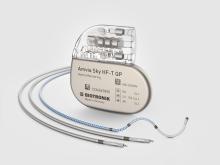New Study Aims to Show Effectiveness of CRT-D Technology for Heart Failure Patients with Atrial Fibrillation First Enrollments Underway for BIO-AffectDX Trial Evaluating Advanced, Two-Lead CRT-DX System
In association with Heart Rhythm 2021, BIOTRONIK today announced first enrollments in the landmark BIO-AffectDX trial, designed to evaluate clinical outcomes of cardiac resynchronization therapy (CRT) in patients with heart failure (HF) and atrial fibrillation (AF).
BIO-AffectDX is a multi-center, observational study that will enroll HF patients with paroxysmal, persistent and long-standing persistent AF, and a standard CRT-D indication according to current guidelines. The study will include up to 400 participants, at up to 50 US sites, implanted with a BIOTRONIK Acticor CRT-DX system (CRT-DX pulse generator and a DX ICD lead) and any commercially available left ventricular (LV) lead.
HF and AF frequently coexist and the concomitant presence of both puts a patient at increased risk for mortality1. Early clinical trials evaluating the effectiveness of CRT technology excluded patients with AF, leading to limited data to establish a benefit and guidelines for using the technology in this population2,3.
Earlier research identified evidence gaps related to the effectiveness of CRT among patients with paroxysmal, persistent and permanent AF, along with the role of atrioventricular (AV) node ablation2. This led to a consensus among the BIO-AffectDX steering committee that additional data on outcomes using CRT-D therapy is needed in a contemporary US population of patients with AF.
"The current data do not offer us a complete picture of the effectiveness of CRT, particularly in regards to our AF patients," said Jonathan Dukes, M.D., Director of Cardiac Electrophysiology at Community Memorial Hospital, Ventura, California, who enrolled the first patient in the trial. "Our current CRT practice strategies for this unique population have been predominately based on expert opinion, and additional outcome data are needed to clarify the optional approach to CRT and heart failure management in our AF patients."
Study endpoints:
- The primary endpoint will evaluate the rate of subjects showing improvement from baseline using a Clinical Composite Score (CCS) at 12 months.
- The trial will assess conversion to sinus rhythm at any time during the 12-month follow-up period to determine the long-term benefits of CRT in this population.
"The BIO-AffectDX trial will gather information about atrial activity with a two lead CRT system," said Alexandru Costea, MD, Director, Center for Electrophysiology, University of Cincinnati. "Not only the procedure time goes down but also the potential for complications is reduced dramatically."
BIOTRONIK has engaged a steering committee to review the design and the protocol for the Bio-AffectDX study:
- Alexandru Costea, MD, Professor of Medicine, Director, Center for Electrophysiology, Rhythm Disorders and Electro-Mechanical Interventions, University of Cincinnati
- Aaron Hesselson, MD, Director of Electrophysiologic Services, University of Kentucky
- Jonathan Hsu, MD, Cardiac Electrophysiology, Associate Professor of Medicine, University of California
- Jackson Liang, MD, Clinical Assistant Professor, University of Michigan
- Stavros Mountantonakis, MD, Cardiac Electrophysiology, Lenox Hill Hospital/Northwell Health
References:
- Cleland JG, et al. The effect of cardiac resynchronization on morbidity and mortality in heart failure. N Engl J Med. 2005; 352:1539-1549
- Tracy CM, et al. 2012 ACCF/AHA/HRS Focused Update of the 2008 Guidelines for Device-Based Therapy of Cardiac Rhythm Abnormalities: A Report of the American College of Cardiology Foundation/American Heart Association Task Force on Practice Guidelines and the Heart Rhythm Society. Circulation. 2012; 14:1784-180
- Fudim M, Dalgaard F, Al-Khatib S, et al. Future research prioritization in cardiac resynchronization therapy. Am Heart J. 2020; 223:48-58
- Shaik N.A., Drucker, M., Pierce, C, et al. Novel two‐lead cardiac resynchronization therapy system provides equivalent CRT responses with less complications than a conventional three‐lead system: Results from the QP ExCELs lead registry. Journal of Cardiovascular Electrophysiology. 2020; 31(7): 1784–1792.
- Thomas, G., Choi, D.Y., Doppalapudi, H., et al. Subclinical atrial fibrillation detection with a floating atrial sensing dipole in single lead implantable cardioverter‐defibrillator systems: Results of the SENSE trial. Journal of Cardiovascular Electrophysiology. 2009; 30(10): 1994–2001.
- Biffi, M., Iori, M., De Maria, E., et al. The role of atrial sensing for new‐onset atrial arrhythmias diagnosis and management in single‐chamber implantable cardioverter‐defibrillator recipients: Results from the THINGS registry. Journal of Cardiovascular Electrophysiology. 2020; 31(4): 846–853.
Boilerplate
At BIOTRONIK, patient well-being is our top priority and has been for 60 years. BIOTRONIK is a leading global medical technology company with products and services that save and improve the lives of millions suffering from heart and blood vessel diseases as well as chronic pain. Driven by a purpose to perfectly match technology with the human body, we are dedicated innovators who develop trusted cardiovascular, endovascular and neuromodulation solutions. BIOTRONIK is headquartered in Berlin, Germany, and is represented in over 100 countries.

